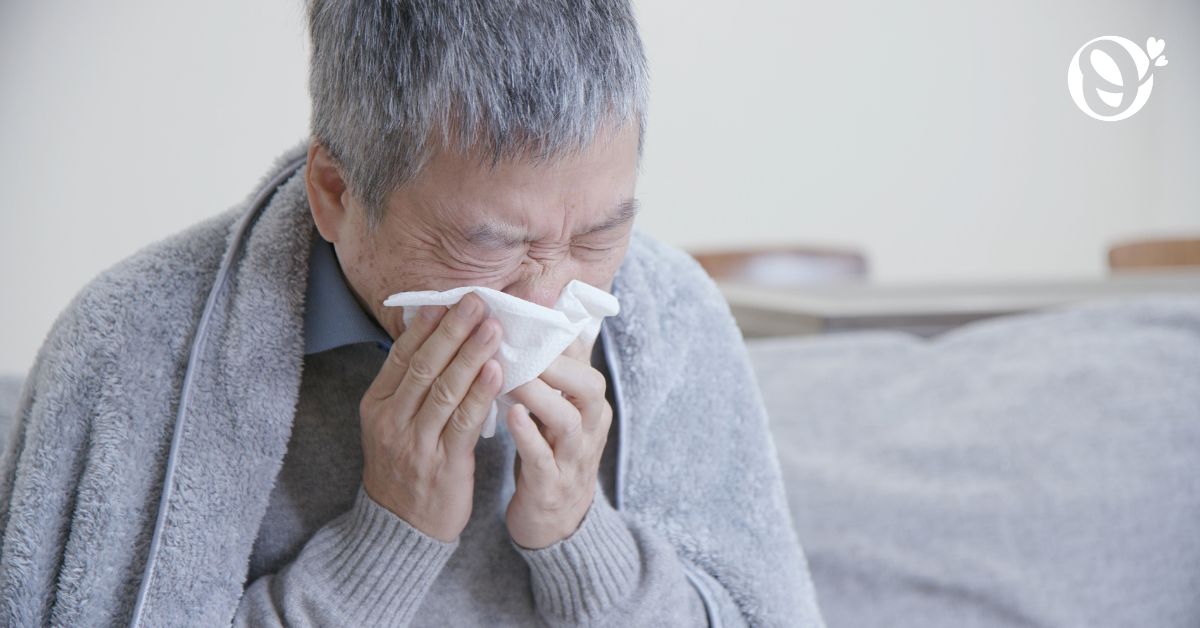Influenza — commonly known as the flu — is often dismissed as a mild seasonal illness. For younger adults, it usually means a few uncomfortable days of fever, cough, and rest. But for older adults, especially those aged 65 and above, influenza can quickly become a serious and potentially life-threatening condition.
We explore why flu in the elderly deserves urgent attention, what makes them more vulnerable, and how families can prevent severe complications.
Why Flu Affects the Elderly More Severely
As we age, our immune system naturally weakens. This reduced immune response means the body struggles to fight off infections like influenza as effectively as before. Seniors are also more likely to have underlying chronic conditions such as:
- Heart disease
- Diabetes
- Asthma or chronic bronchitis
- Lung or kidney disease
These conditions increase the risk of flu-related complications. What might start as a simple fever or cough can quickly develop into pneumonia, dehydration, or confusion, all of which may require hospital care.
Flu in the elderly doesn’t just make them unwell. It can cause what doctors call bacterial superinfection — a situation where a viral infection (like influenza) leads to a secondary bacterial infection. In seniors, this often manifests as bacterial pneumonia, which can escalate rapidly due to reduced body strength and resilience.

The Hidden Impact of Influenza on Families
When an elderly family member becomes ill with the flu, it affects more than just their health. Hospitalisation may require family members to take time off work or arrange for temporary caregiving support. This ripple effect can cause stress, anxiety, and financial strain, especially when multiple hospital visits or post-recovery care are needed.
Beyond individual families, widespread flu cases among seniors place additional pressure on the healthcare system, especially during peak flu season when influenza A spreads quickly through the community.
Prevention: Annual Flu Vaccination
One of the most effective ways to protect seniors from severe influenza is through annual flu vaccination. It is strongly recommended that all elderly individuals, and those who live or work closely with them, to get their yearly flu shot.
“The flu vaccine may not guarantee you won’t get the flu, but it greatly reduces the severity and duration of symptoms. Make sure to get the vaccine for the current year, as the flu strains change annually.”
– Dr. Goh, Oretha’s Senior Care TGIF Doc Talk
Flu vaccines are particularly important for seniors living in close-contact environments such as senior daycare centres, nursing homes, or multi-generational households.

If You Get the Flu: Early Treatment Matters
Even with vaccination, some seniors may still catch the flu. The key is early treatment.
Antiviral medications such as Tamiflu (oseltamivir), Flu Hart, or other generic equivalents can be very effective when taken within the first 48 to 72 hours of symptom onset. These medications stop the virus from multiplying in the body, helping to:
- Shorten the duration of illness
- Reduce complications
- Prevent pneumonia and hospitalisation
Families should consult their doctor promptly when seniors show flu symptoms such as:
- Persistent fever
- Shortness of breath
- Lethargy or confusion
- Chest discomfort

Supporting Seniors During Recovery
For frail or bedridden seniors — especially those aged 80 and above or living with conditions like stroke or Parkinson’s disease — recovery from the flu can be slower. Because their ability to cough or clear mucus is often reduced, there is a risk of mucus buildup in the lungs, leading to infection.
Chest physiotherapy can be very helpful. Techniques like gentle chest percussion help loosen mucus and improve breathing. Some may also benefit from expectorant medications to make phlegm easier to clear.
Caregivers and families should monitor hydration closely, encourage small sips of water frequently, and ensure adequate rest.
Everyday Habits that Prevent Flu
Prevention doesn’t end with vaccines. Good daily habits play a crucial role in protecting seniors, especially those attending group activities or daycare programmes.
Here are some practical tips:
- Wash hands regularly with soap and water
- Wear a mask when feeling unwell or in crowded areas
- Disinfect commonly touched surfaces, including doorknobs, handrails, and mobile devices
- Avoid close contact with anyone showing flu-like symptoms
- Maintain good nutrition and hydration
- Stay physically active to strengthen the body’s immune system
Small actions can make a big difference, both in preventing flu transmission and in supporting overall health and well-being.
The Key Takeaway
For the elderly, flu isn’t “just a flu”. It can become a serious health threat that impacts both the individual and their family.
With timely vaccinations, early medical attention, and consistent hygiene practices, seniors can significantly lower their risk of severe illness and hospitalisation.
Expert Advice from Dr. Goh
Listen to Dr. Goh’s expert overview on why influenza poses greater risks for older adults, and the key steps to protect your loved ones this flu season.
Important Note
This article is for informational purposes only and does not constitute medical advice, diagnosis, or treatment. Always consult a qualified healthcare provider regarding any questions about your or your elderly loved one’s health or medical condition.




